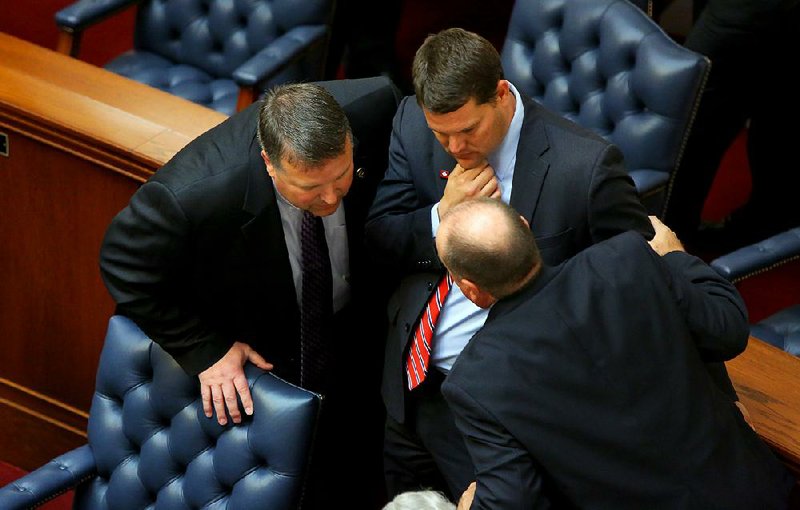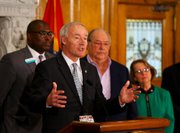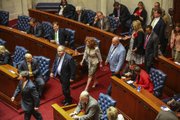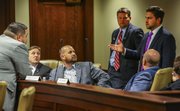Legislation reauthorizing the use of federal Medicaid funds to purchase private health insurance for low-income Arkansans cleared the Legislature's Joint Budget Committee on Wednesday and will be considered today by the Senate.
Senate Bill 121 would grant spending authority totaling $8.4 billion in state and federal funds for various Medicaid programs. That includes $1.6 billion in spending authority for the Medicaid expansion to those of low income, including $43 million in state funds to match the federal funds, said state Department of Human Services spokesman Amy Webb.
Calendar
This is the calendar of public events of the 90th General Assembly for today, the second day of the 2016 fiscal session.
COMMITTEES
9 a.m. The Joint Budget Committee meets in the Multi-Agency Complex, Room A.
10:30 a.m. Joint Performance Review meets in Room 151 of the Capitol.
HOUSE
1:30 p.m. The House convenes.
SENATE
1:30 p.m. The Senate convenes.
The state will pay 5 percent of the cost of the program in 2017, and its share will gradually increase to 10 percent by 2020.
In a voice vote, the Joint Budget Committee recommended approval of SB121 after it rejected an amendment proposed by Sen. Missy Irvin, R-Mountain Home, aimed at prohibiting the department's Medical Services Division from using an emergency rule to implement managed care.
Senate President Pro Tempore Jonathan Dismang, R-Searcy, said he doesn't have "any predetermined expectations" about whether the appropriation measure for the Medical Services Division for fiscal 2017 will get the required 27 votes in the 35-member Senate.
Noting that the House of Representatives rejected measures authorizing the use of federal funds for the Medicaid expansion several times in the 2013 and 2014 sessions before it approved them, Gov. Asa Hutchinson said the legislation "may or may not pass on the first vote" in the Senate. The fiscal session started Wednesday.
"I am hopeful the senators will recognize the consequences to their district and will support [Department of Human Services] funding," the Republican governor told reporters Wednesday afternoon. "If not, we will look at what we need to do and ... the approach that we should take then."
But the leading opponent of the Medicaid expansion, Sen. Bart Hester, R-Cave Springs, said he expects 10 Republican senators -- who voted against legislation in last week's special session to change the private-option program into what Hutchinson calls Arkansas Works -- to vote today against approving the appropriation.
That's enough votes to block approval in the Senate.
"The governor can't budge or won't. We can't budge or won't," Hester told reporters. "Where do we go? We have a responsibility to the people of Arkansas to govern and to work something out. I think we both feel like we are in principled positions and we're working through every possible angle that we can find to try to find some compromise on this and ultimately compromise means no side gets exactly what they want and I wouldn't have any idea of what that would be at this point because anything I have proposed has been shot down, so we'll see."
The Medicaid expansion, enacted by the Legislature in 2013, extended coverage to adults with incomes of up to 138 percent of the poverty level: $16,394 for an individual, for instance, or $33,534 for a family of four.
Most of the 267,000 people covered receive the coverage through the private option, which uses Medicaid funds to buy private insurance coverage.
Legislation enacted in last week's special session would make changes in the program that Hutchinson has said would encourage enrollees to stay employed and take responsibility for their health care.
Those changes include charging premiums of about $19 a month to participants whose incomes are above the poverty level, subsidizing some enrollees' coverage through employer plans and referring some beneficiaries to job-training programs.
Hutchinson on Wednesday declined to reveal what options he's willing to consider, if the appropriation for the Medical Services Division fails to clear the Senate today.
"First of all, I want the DHS appropriation to pass, the Arkansas Works funding to pass," he said. "If it doesn't, we want to have conversations as to how we can get this funded and to continue the program.
"If we ever have to go back to Joint Budget to rework the budget, that's a longer process and there could be a necessity of a break in that time frame," Hutchinson said. "But that's really a call I would only make with the House and Senate leadership."
If the appropriation measure fails to clear the Senate today, House Speaker Jeremy Gillam, R-Judsonia, said recessing is an option for the Legislature.
"Sometimes I think people can get clarity and just being able to go back and re-engage with their districts and their constituencies -- give them a chance to visit with everybody," he said.
It's not "Plan A" but it's "one of many possibilities on how the next potentially 45 days could go," Gillam said. The longest a fiscal session can go on is 45 days.
Dismang said there has been discussion by House leaders about recessing the Legislature.
"I don't believe that is the situation we'll find ourselves in the Senate," he said.
Asked if the House would vote on other appropriations before the funding for the Medicaid expansion -- as House Democratic leader Michael John Gray of Augusta requested in a letter Wednesday -- Gillam said he was taking a serious look at Gray's request.
"I owe them that," he said.
Gillam said he didn't know what today's Senate vote would look like.
"If I was going to go betting, I'd be down at Hot Springs," he said, referring to Oaklawn Park, the racetrack. "I learned a long time ago -- my freshman term -- this stuff is so fluid."
In any case, he didn't expect the majority of representatives to abandon their support of Arkansas Works. In the House, he said he expected more than 75 representatives to vote for the appropriation.
"I think, pretty much, the die has been cast. The policy's been passed," he said. "You've got 70 percent of the House that's voted for it. I think those 70 members are pretty solid and adamant in moving forward with the policy and I don't see them willing to back up just because two dozen folks in the House ... were to say that we didn't agree with that. I don't think many folks look at that as an appropriate governing philosophy -- to let that small minority dictate the rule and the direction in which we go."
Hutchinson said he's pleased that Gillam has indicated there are at least the required 75 votes in the House to approve the appropriation.
"This means that there is at least five members of the House who voted against the policy of Arkansas Works, but they recognize it is a totally different issue when it comes to the funding of it," he said.
But he also singled out two of the 10 Republican senators who've said they plan to vote against funding the Medicaid expansion.
"My obligation is to inform and make sure that we realize what this vote means to the state's budget, but also to their districts," Hutchinson said.
Hutchinson has proposed a general-revenue budget of $5.33 billion in fiscal 2017, an increase of $142.7 million over spending in the current fiscal year, and factors in his nearly $101 million cut in individual income-tax rates enacted by the 2015 Legislature.
Along with Joint Budget Committee co-Chairman Rep. Lane Jean, R-Magnolia, Gillam has proposed an alternative budget in case the Medicaid expansion isn't reauthorized. Their proposal would reallocate more than $100 million in Hutchinson's proposed budget to pay for transferring some people who are on the Medicaid expansion back to traditional Medicaid and also increase uncompensated-care costs for some agencies, such as the University of Arkansas for Medical Sciences.
Hutchinson said Sen. Linda Collins-Smith, R-Batesville, "has one of the districts that will be hit the greatest by the cuts that would be imposed from the alternative House budget."
The alternative House budget cuts would reduce funding to Collins-Smith's Senate district by about $651,000, including a $400,000 cut for higher-education, a $125,000 cut for public schools, a $42,000 cut for pre-kindergarten, a $23,000 cut for senior-citizens centers and an $11,000 cut for libraries, Hutchinson said.
"So my question to Sen. Smith is, very clearly, 'Do you support these cuts to your district? If you do not support these cuts to your district, what is your alternative budget? Where do you think those cuts should come from?"
Collins-Smith, who is an opponent of Arkansas' version of Medicaid expansion, replied in a written statement, "These proposed cuts are simply scare tactics designed to keep Obamacare's Medicaid expansion in place.
"My constituents are angry about the run-away spending in government at both the federal and state level, and they elected me to put a stop to this massive expansion of government," she said.
Hutchinson said he's also getting different signals from some senators such as Bryan King, R-Green Forest, regarding the Department of Human Services' budget.
"One signal is that this money is easy to cut. There is waste in DHS. There is no problem cutting DHS, but it is a different message by Sen. Bryan King in his district," he said, referring to a Madison County Record article in which King is quoted as saying he hopes to see increases in Human Services spending, particularly for foster families.
"So I get heat from the districts, from the Madison County Wellness Center and from the senior citizens across the state saying, 'We've got to have this funding,' and yet Sen. King comes here and says, 'It is easy to cut DHS,' " the governor said.
"So my question to Sen. King, is, do you want us to follow his admonition to the district and increase funding for foster care or do you want us to listen to his message here in Little Rock that it's easy to cut, no problem cutting DHS?"
King, who is an opponent of the Medicaid expansion, replied that Hutchinson "is trying to be a lawyer ... in some court case trying to pull out something in a desperate case.
"DHS needs to be spending less money than they do right now," he said.
"That doesn't mean that there are not things like foster care that need more money; that there is a crisis and we've got to do something about it," King said. "It is just desperation. He is trying to pull something out of Bryan King; he is trying to tie everything into Medicaid expansion. He is trying to tie prisons into it and every type of issue, and I'm not going that route."
On Tuesday, Hutchinson said he won't call a special session for lawmakers to consider his highway-funding plan this spring if they won't reauthorize the Medicaid expansion's funding in the fiscal session.
In January, the Republican governor unveiled his plan to initially increase state highway funding by about $45 million to $50 million a year to match about $200 million a year in additional federal highway dollars. He planned to tap state surpluses and reallocate some state funds.
A Section on 04/14/2016




